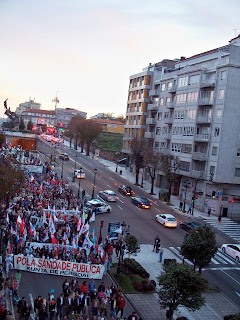It shouldn't be a surprise to anyone that there has been a lot of unrest in Iberia (that's Spain and Portugal) lately. High unemployment plus rising taxes and cuts in social services do not happy bedfellows make. Recently, hardly a week has gone by in which I haven't seen some kind of protest marching down the street, be it here in Vigo or nearby in Portugal.
Protest march in Lisbon
The Portuguese people want jobs ("more and better employment" as the sign says)
A march for public healthcare and its employees here in Vigo
But yesterday was an official general strike day, like the one that we had in March--except this time, it was in ALL of Iberia, plus some protests in France, Italy and Greece. The strike meant that when the clock struck midnight on Tuesday night going into yesterday, all businesses (including bars and restaurants, gas stations, buses, banks, grocery stores, you name it) shut down for fear of having their windows broken by angry trashcan-dumping, firework-wielding hooligans starting to strike immediately. And almost all of these businesses stayed shut all day, because those same hooligans were going around town and screaming about breaking the strike at the workers in the cafes and stores that were open, then vandalizing them with spraypaint.
Sign advertising the strike day (folga xeral means general strike in Galician)
The goal of the strike was to stop the economy for the day and get the attention of European leaders, so in theory no one was supposed to spend any money or support "the system" in any way, and the hooligans were doing their best to enforce that.
Protesters
Not everybody was out vandalizing the scabs, though; what most people were doing (all across Spain, from what I heard) was participating in a march, which (in Vigo) began in a plaza at the top of the city and ended at another a ways downhill. I attended, not because I was on strike but because I was told it wouldn't be worth it for me to come to work when almost no students would be there anyway (although about half my coworkers went, but only 19 kids in the whole school showed up).
Massive march in Vigo
There were so many people at the march that you couldn't move, but it was interesting to me that everyone was just walking calmly. It felt more like a mass Sunday stroll than a protest march, minus the giant balloons with political propaganda on them. Only a few people were chanting or seemed really angry. But there were so many people that apparently by the time we made it to the second plaza, the speeches were over and lots of people were heading home for lunch, which is exactly what we ended up doing. It all felt really anticlimactic, especially when lots of businesses opened up again in the afternoon and all the hooligans seemed to have dissipated.
Everyone with their Galician-flag-colored balloons
Most of the buzz I heard from Vigueses about the strike was how useless a one-day strike was, how it wouldn't accomplish anything, and how it was stupid to complain when Galicia just had elections and most people didn't even vote, so the conservative party won again. And honestly, I tend to agree. Quite apart from the stupidity of the violent hooligans, I really don't think one day of missing work is going to do much, particularly considering all the money the corporations and government saved by not having to pay those people yesterday.
I guess I'm just contrasting this one-day strike with pickets and marches and strikes I've seen and heard about in the US, like in my freshman year of high school when all the teachers went on strike for a month or the protests I went to in Madison, WI against Governor Walker. And from what I saw, this strike day (día de huelga in Spanish, or folga in Galician) seems like it didn't work as well as those ones did. I'm not sure if it accomplished much or even got that much attention worldwide. Reading US newspapers, it seems like the answer is no (although judging by the usual quality of US newspapers, that could just be normal American ignorance to anything happening outside its borders). But it is interesting to see how people in different countries try to express their feelings about political agendas.
And just for the record, I'm not saying Spain doesn't have the capacity for those kinds of more drastic measures as well--they did do the 15-M (masses of people occupying Puerta del Sol in Madrid) just over a year ago, which was what seems to have inspired the Occupy Wall Street movement. But as far as protests go, to me this one (dubbed 14-N, for the date) seemed a little less-than-effective. I know it's historical that much of Europe is banding together to fight cuts in public services, and that two general strikes in one year is a big deal, but I don't know that it's going to change anything, particularly when the crisis is this bad.
Anyway, since Thanksgiving is coming up and I spent all day teaching lessons about it so I've got it on the brain, I'm going to wrap up by saying how thankful I am to be able to have a job in Spain at this particular moment in history, but also to know that no matter how bad things get in Europe, I always have an American passport waiting to whisk me away (should I choose to go) to a place where things are slightly more economically stable. Plus America gave me the gift of the English language, which is enormously valuable and one of the only things keeping me afloat in these uncertain times. Cheers, USA.







No comments:
Post a Comment